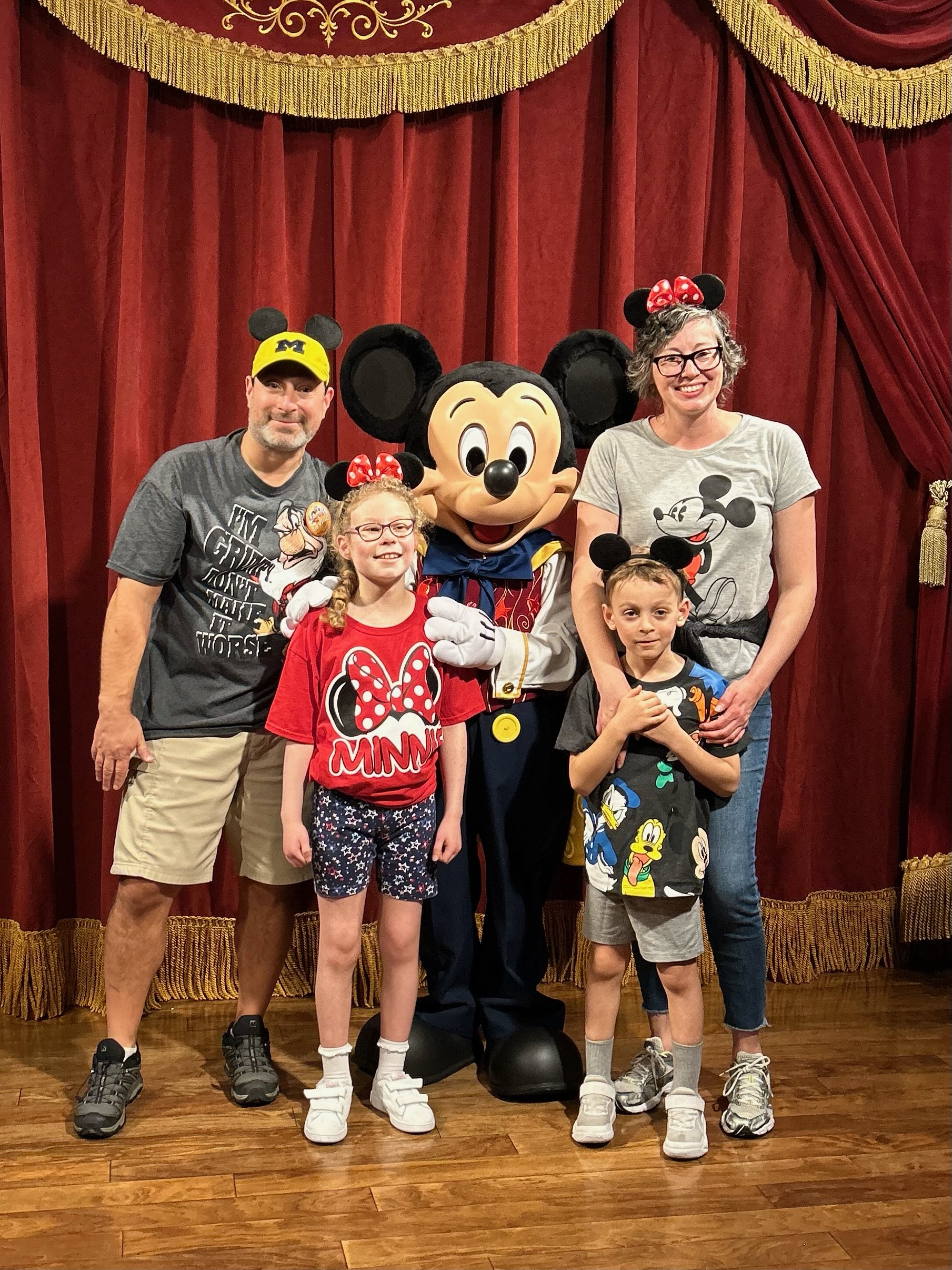Local News
Winnipegger Mark Joseph leading efforts to fund treatment for rare genetic disorder that afflicted his daughter

By MYRON LOVE It’s not likely that many readers are familiar with Prader-Willi Syndrome (PWS), but it is a condition that Mark and Jennifer Joseph know all too well, as their ten-year-old daughter, Darwin, lives with this disorder.
Prader-Willi Syndrome is a rare life-threatening genetic disorder that occurs in approximately one out of every 15,000 live-births. PWS affects many aspects of an individual’s life. A particular symptom is a relentless and insatiable hunger.
“We were fortunate that we were living in Toronto when Darwin was born so that we had access to many, many specialists and the Hospital for Sick Children,” says Mark, a pilot with Westjet who moved to Winnipeg in 2021. Immediately at Darwin’s birth the doctors knew there was something atypical about Darwin. The room flooded with specialists to assess and treat the newborn, who was labelled “failure to thrive,” as she was as limp as a rag doll, and wasn’t crying. “This was definitely one of the scariest and most traumatic experiences of our lives,” adds Mark.
“The hospital’s lead paediatrician had no experience with PWS, but remembered hearing of it. Genetic testing began, and by one-month-of-age, we had a definitive diagnosis of Prader-Willi Syndrome – a diagnosis that would change the trajectory of our lives,” notes Jennifer.
“Darwin’s diagnosis required us to become experts in her condition,” says Mark, who is the newly installed President and Chair of the Foundation for Prader-Willi Research Canada. “Most medical professionals have never encountered anyone living with it. We had to learn all we could to best advocate for our daughter so that we could have the best possible outcome for her future.”
“Darwin’s early years were filled with therapies – physical therapy, occupational therapy, speech therapy, hippotherapy, even feeding therapy, as an infant due to her low muscle tone. We still have therapies, but nothing like in Darwin’s first year of life. Before the age of one, we had attended over 165 medical appointments and therapies. It was exhausting and mentally very hard. This was our first child and definitely not how we had envisioned parenthood,” says Jennifer.
As Darwin has aged, her insatiable appetite has grown with her. In order to keep her safe and provide her a bit of independence in her own home, Darwin’s parents have had to put locks on the fridge and pantry. “Anywhere that food is stored needs to be locked. This helps us keep Darwin safe from overeating, as individuals with PWS have a high pain threshold and can unfortunately eat until they rupture their stomach. But it also helps Darwin manage her food-related anxiety so she doesn’t have to worry about gaining access to food and hurting herself,” notes Mark.
Food needs to be controlled and scheduled in any environment in which Darwin is present. Her school has taken great lengths to ensure food safety and open communication about food-related activities. Every meal has to be nutritious and portion controlled, as not only is Darwin always hungry, her slow metabolism requires her to need only half the typical calories of her peers – otherwise she will face life-threatening obesity and its related diseases.
Locally, on Sunday, June 9, Mark and Jennifer – in conjunction with three other Winnipeg families who are raising children with PWS, organized their second annual “One Small Step” Walk for Prader-Willi Syndrome Research at Kildonan Park. Mark reports that this year’s walk attracted 130 participants and raised over $22,000 – about $6,000 more than last year.
The funding, he reports, is being directed toward research. Clinical trials are taking place around the world to help understand the mechanisms of Prader-Willi Syndrome and investigate new treatments. One such trial is being conducted by Dr. Jennifer Miller, a professor and researcher in the division of Paediatric Endocrinology at the University of Florida in Gainesville. Dr. Miller, the world’s leading specialist in PWS, currently works with over 500 patients with Prader-Willi Syndrome from around the world, and has been working towards achieving an effective treatment for hyperphagia (insatiable hunger) for the past 12 years.
The Josephs report that research may be close to a breakthrough in developing a treatment that can minimize some of the more challenging aspects of PWS. “Right now, Darwin is in public school,” Mark notes. “She can read and write and is fairly high functioning, but she is constantly hungry and anxious about food and distracted by the desire to attain food. This obviously has a huge effect on her ability to concentrate and learn. Without treatment, she will not be able to manage the demands of high school or look forward to a career.”
“A treatment will be life-changing for her and for us as a family – she may be able to lead a full and independent future… something we never thought we’d see in the early days of her diagnosis,” adds Jennifer. “Mark himself was responsible for much of the increase in the amount of money raised at this year’s walk thanks to the extensive network of contacts that he has built up over the years through his career in the aviation industry, and as a part of the Jewish community.
“A lot of people are willing to help, but they don’t know how,” Mark observes. “Our fundraising walk provides focus for friends, family, colleagues, and even strangers who want to help.”
For Mark, this is his second go-around in Winnipeg. He previously lived and worked here in 2008. That was when he met Jennifer. He himself is originally from Toronto. He notes that his father is from Haifa and his mother grew up as part of a small Jewish community in Cornwall – which is about 90 km southeast of Ottawa. Although his wife Jennifer is not Jewish, the couple agreed to raise their children – Darwin and younger brother Edison, in the Jewish faith.
“In Ontario, we were living in an area called the Blue Mountains, two hours north of Toronto, and there was no Jewish community,” Mark notes, “So when the pandemic happened, we decided that it was time to move back to Winnipeg to be closer to Jenn’s friends and family. Knowing that there was a large and vibrant Jewish community here made the decision an easy one.”
The Josephs enrolled their son Edison in Gray Academy for junior and senior kindergarten, and then transferred him to the Brock Corydon Hebrew Bilingual program. “We want him to have a strong foundation and connection to his Jewish roots,” Mark says. And though Darwin is not enrolled in the Hebrew program, she enjoys many activities and programs through the Rady JCC. “We are looking forward to deepening our involvement in the Jewish community,”Mark adds.
Readers who would like to support the Josephs’ efforts to develop a treatment for PWS and alleviate the challenges that Darwin and those afflicted with PWS face, can do so by visiting their One Small Step fundraising page at: tiny.cc/70cpyz
To learn more about Prader-Willi Syndrome and the research being conducted you can visit: www.fpwr.ca or www.fpwr.org
Local News
Second annual Taste of Limmud to feature Jewish dishes from around the world

By MYRON LOVE Many words in English have multiple meanings. Take the word “taste” for example. There is the literal meaning – the sense of taste; it can also mean sample – or preferences. It can be a noun or a verb.
In “A Taste of Limmud,” the term is used both in its literal meaning – as a sampling of Jewish dishes from different parts of the world, as well as a prelude to our community’s upcoming 16th celebration of Jewish learning and culture, which is scheduled for Sunday, March 15.
This is the second year for “A Taste of Limmud,” which is coming up on Thursday, February 19. The event will be held at the Shaarey Zedek and will feature Jewish dishes from Argentina, Yemen, Turkiye, Aleppo and Eastern Europe, as well as Israel .
“We sold out last year for A Taste of Limmud,” reports Raya Margulets, Winnipeg Limmud’s newly appointed co-ordinator. “We had 120 participants last year. I am hoping to have 150 this year.”
The 2025 debut of “A Taste of Limmud” was actually Margulets’ introduction to the Winnipeg Limmud co-ordinating team. Originally from Israel, Margulets’ first position with the Jewish Federation of Winnipeg was in 2022 when she was appointed Hillel director – just a year after she had served as Hillel student president at the University of Manitoba.
She left her role with Hillel after about a year to participate in the ten-month online Israel 21c Digital Ambassador program, which is aimed at young people between the ages of 18 and 25. That program is part-time and casual, conducted remotely, intended to provide basic experience in digital communication and storytelling focused on everyday life in Israel.
“I spent a few hours a week working on simple digital content and social media, attended occasional online seminars, and participated in light collaborative projects,” Margulets reports. “The focus was on sharing positive, apolitical cultural stories rather than politics or advocacy.”
She was hired last year by the Federation to oversee our first Taste of Limmud – as a special project that was funded by the Jewish Foundation of Manitoba.
She was appointed at the beginning of September as Limmud Co-ordinator, replacing Florencia Katz, the original co-ordinator, who stepped away after 15 years in the role. Katz remains a member of the Federation staff as Director of Education and Engagement. She also has a focus on the PJ Library program.
“Florencia was a great mentor and is still a big help to me,” Margulets says.
She reports that the upcoming 16th annual Winnipeg Limmud will once again feature a wide and eclectic range of speakers. “I can confirm that all of our community’s rabbis – as well as Rabbi Benarroch – will be among the presenters,” she notes. “Rabbi Benarroch will be coming from Israel and be here in person.”
Also confirmed thus far are Yaron Deckel, an Israeli journalist and broadcaster, as well as Haskel Greenfield, Distinguished Professor of Anthropology, and Winnipeg’s own Rimon Art Collective. Collective members include young Jewish artists Mishelle Aminov Kosonovsky, Yael Freifeld, Etel Shevelev, Halley Ritter, and Shan Pullan
Stay tuned for further updates as to other 2026 Winnipeg Limmud presenters on this website or go online to keep up to date or register for programs at limmudwinnipeg.org.
Local News
Sharon Delbridge’s annual health & wellness retreats in Puerto Vallarta have become popular with many Winnipeggers

By BERNIE BELLAN Over the years we have revisited stories from time to time – to catch up with individuals who have made a mark in this city and to see where their lives have taken them since the last time we wrote about them.
One such individual is Sharon Delbridge, the youngest daughter of Sol and Rachel Fink, and younger sister to Percy, Shayla (Posen), and the late Sheldon Fink (who died all too young at the age 57 in 2021).
Myron Love has written many times about Sol and Rachel Fink, who continue to amaze for their vitality – with Sol now 101 and Rachel having just turned 99.
As Sharon notes in an email sent to me, “My parents work out everyday. Not at Rady anymore. They do exercise at home & in their condo gym (200 Tuxedo) Move their bodies daily. My mom leads her and my dad daily in movement. It’s incredible.
“They have been a huge inspiration to all of us.”
Aside from the fact that the Fink family was a very musical family, their penchant for fitness is clearly something that rubbed off on Sharon, in particular.
My own wife, Meachelle, who was quite the fitness fanatic herself in her day (not that she’s been put out to pasture quite yet), profiled Sharon for The Jewish Post & News in 2015. In that story, Sharon explained how she came to be one of the most popular and best known fitness instructors, not only at the Rady JCC – where her classes in a wide variety of different areas, were – and still are, extremely popular, but at many other venues throughout Winnipeg.
Here’s part of what Sharon told Meachelle about how she came to teach so many different types of fitness classes:
“I’ve been into fitness my whole life. I come from a very musical family but also a family that always works out. When I was in my 20s I was teaching aerobics for several years as a part-time job while in university. When I had my three children (Milan, Jared and Cassie Ackerman) I ran a hand-painted clothing business in my home called Milan Designs, and I sold to ladies’ and children’s stores all over Canada.
“I was always working out and have loved fitness classes. I went back and got more certifications in my 40s. I’m certified to teach many specialties and have been actively teaching at the Rady for over 10 years. I now specialize in women’s boutique fitness: Zumba, Yoga and Barre classes. The three specialties blend beautifully together and I have a big following of people from all over Winnipeg that come to my classes. I have every Zumba certification that’s available: Zumba, Zumba Gold (for seniors), Zumba Toning (with weights), Zumba Aqua (in water), Zumba Step and Zumba Sentao (using steppers and chairs).
“I’ve taken many yoga certifications through the past 10 years and I’ve been teaching Barre classes, which are the latest and hottest classes for women. I’m always taking new training in these three specialties to continue to stay fresh and always have new and exciting things to present to my class. That’s how I stay unique in my field. I’m always learning and always developing my classes to be the best they can be. I spend tons of time finding the best music and choreographing.
“I truly feel that if you work out and look after your body, you will always have a positive outlook on life. Exercise is a huge healer mentally and physically. I have seen so many incredible changes in women that come to my classes. They have transformed their bodies and live happier and healthier lives.”
It was a year after Meachelle’s article about Sharon that Sharon and her husband, Darcy, began going to Puerto Vallarta for the winter. As Sharon noted, “I started teaching at a Yoga studio the first winter we were here in PV. It’s easy to meet people & build community when you’re teaching snowbirds from everywhere
I love sharing my love for fitness & yoga & moving our bodies.”
But, for six years prior to making Puerto Vallarta her and Darcy’s winter home, Sharon had already been conducting annual one-week health and wellness retreats in Puerto Vallarta. She has continued to conduct those retreats every year since. The most recent retreat was held from January 25-February 1 at the Fiesta Americana All Inclusive Resort.
Here’s how Sharon describes the purpose of those retreats:
“For over 15 years, my Health & Wellness Retreat has brought together women of all ages to reconnect, recharge, and celebrate movement, friendship, and balance. Hosted at a beautiful all-inclusive resort, guests can truly make the week their own holiday experience. While primarily a women’s retreat, many now bring their husbands or partners who are welcome to participate as much or as little as they choose.
“Throughout the week, we offer seven daily classes ranging from sunrise meditation and yoga to toning, Zumba, yin yoga, and our signature Aqua Zumba — which transforms into a high-energy, joy-filled pool party. Each evening, we gather for sunset yoga and take time to celebrate the beauty of the day together.
“The retreat blends wellness with enjoyment, allowing guests to indulge in the resort’s wonderful restaurants and social atmosphere while still feeling strong, energized, and revitalized. It’s a balanced, uplifting experience where participants leave feeling nourished in body, mind, and heart, often forming lifelong friendships. This year, we were proud to welcome 40 participants.”

In the picture accompanying this article you might recognize several Winnipeggers. I asked Sharon how many Winnipeggers were participants in this year’s retreat?
The answer, she said, was the majority (31) were from Winnipeg, while six were from Las Vegas, one from Ottawa and two from Edmonton.
The last two years, Sharon also noted, another well known member of the Rady JCC staff, Dona Watts-Hastings, who’s a physiotherapist, also a yoga and Pilates instructor, has joined Sharon in conducting the retreat. Sharon adds that Dona’s physiotherapy clinic is inside the Rady JCC. Dona also brings some of her clients to the retreat.
I wondered though, how active Sharon is in teaching classes when she’s back in Winnipeg? Does she never tire of teaching so many classes? I wondered.
Sharon’s answer was: “Yes, I’m still in Winnipeg half of the year and I will always teach at the Rady… Zumba, sculpt , yoga & barre class – also spinning if they need me to sub. . I teach at Assiniboine park and other gyms, too. Every morning I teach and often sub other classes. Busy all spring & summer.”
Whew! It’s tiring just reading about everything Sharon does. If you would like to find out more about next year’s health & wellness retreat in Puerto Vallarta and how you might be able to join up, contact Sharon at sharon@freshsoulfitness.com.
To watch a video of what a typical day at the retreat consisted of go to freshsoulfitness
Local News
Jess Pudavick: artist and business executive

By MYRON LOVE Jess Pudavick is a rare individual in that she combines careers as an artist and a business executive.
I first became aware of Jess last summer when she was one of the artists/craftspeople with a display table at the Gwen Secter Creative Living Centre’s annual garage and craft sale. What piqued my interest was her focus on incorporating resins in her art pieces.
Last week, while interviewing Ms. Pudavick at Super-Lite Lighting on Waverley – I learned much more about the multi-talented Ms. Pudavick.
While I have a passion for art,” she notes, “I was not interested in becoming a stereotypical starving artist.”
The daughter of Stuart and Beth Pudavick joined the company (which her father acquired in the early 1980s (along with partners Simon Simkin and Allan Hochman) 17 years ago. Her brother, Ray, also joined the company 10 years ago, Jess notes.
At Super-Lite, Jess’s title is Custom Homes Lighting Consultant. She works with builders, designers and contractors to build the lighting for the home, as well as to choose the right lights for the space. She also manages the company’s social media and website.
“I enjoy working with my dad and Ray,” she says.”I also love what I do at Super-Lite. It is similar to my feelings about my art. You don’t know the end result when you start. It is nice to see something being built from nothing and seeing the end result – and knowing how happy the client is in the end.”.
As an artist, the graduate of Brock Corydon’s Hebrew Bilingual Program, Shaftesbury Collegiate and the University of Manitoba, recalls that she started at a young age. “As a kid,” she says, “I was always doodling and drawing cartoons.”
While she has worked with several different artistic media, she observes that what she likes about creating art with resins is the challenge.
“Resin is a temperamental material,” she points out. “When you start a project, you have no idea what the finished product will look like.”
She explains that there are two ways to work with resin. You can put traditional resin in a mold and wait 24 hours for the resin to dry. Or you can speed up the process by using a UV style resin and exposing the resin to UV rays.
“I prefer letting the resin dry naturally,” she says. “I find I have more control over it.”
Her resin-infused art comes in many forms. She produces earrings and necklaces, candle holders and ashtrays, dice and computer keys. She has also created resin-infused mahjong and rummikub tiles and even sets of dominoes with paw prints. A popular item, Jess says, is a custom coloured/theme wedding set of dominoes.
“People love them,” she says of the dominoes tiles.
(The latter reflects her own passion for dogs for which she is often a foster “parent”. She notes that she also creates resin-infused memory keepsake urns for the ashes/hair or fur of beloved pets – a product that is gaining popularity.)
Then there is the resin-infused coffee table that has a place of honour in her own home. “With my love of plants and resin, my partner and I took our existing coffee table, added various clippings of my own plants and created a fun resin-sealed table,” she recounts. “It really looks cool. It is unique. it attracts visitors’ interest. Every time I look at it, I see something different.”
Jess reports that generally sells her works of art through craft sales and her Instagram page (@thejesso09) for between $10 and $30. Her major source of sales though, she adds, is through word of mouth.
But Pudavick avers that she doesn’t do her art with an eye to sales.
“I create for myself, not for the approval of others. I find it relaxing – a good way to reduce stress. It’s also rewarding to see that others want something you have created.”
She strongly believes that enjoying your work is an important element in being happy. Equally important, she notes, – both in business and art – is to have satisfied customers.


